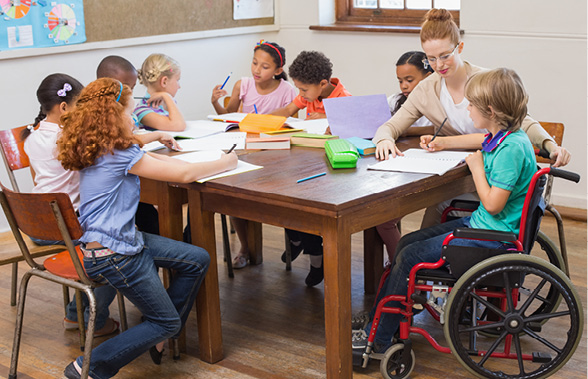Your child and school
Children have many different experiences and feelings about school. When they are ill, their experiences change, and their feelings may change too.

Your child may get along well with other children and with teachers. They may have subjects or activities they like to do, and they may miss these when their illness keeps them away. On the other hand, when your child is ill, they may be bullied or treated badly by other children. They may not be able to take part in activities because of their illness. They might miss a lot of school. Many children who are ill say they just want to be treated “normally”. They don’t want to be treated better or worse because of their illness.
Each child’s relationship with school is different. Your child’s school staff may or may not have had past experience with seriously ill children. Some staff members will be more comfortable supporting your child than others. Some will have ideas about what they can do to help but others will need your help. This section describes some of the challenges your children might face at school. It includes ideas about how to work with school staff to support your ill child, their siblings, and classmates.
The staff at your child’s school may not know how to support a child who is seriously ill. You can help by teaching them about what your child is going through, how the experience affects your other children, and what the school can do to help. It’s up to you to decide how much information you want to share. It’s also important to respect children’s wishes about what information is shared about them with staff. However, it is very important for school staff to know about:
- Your child’s health, including:
-
- Symptoms that might affect them at school
- How to respond when your child’s condition changes in the classroom (staff should have been told specific things to watch out for and how to react if they occur)
- Changes in your child’s condition, including:
-
- Whether their illness or abilities are changing or getting worse
- How staff can prepare for or deal with these changes
- Your child’s understanding of their illness so that staff know how to answer questions or comments from other students and parents
If your child wants to go to school after being away for a long time because of their illness, it helps to plan ahead with your child, their teachers, and the principal. Your child might want to go for a short visit with classmates or they may want to stay longer. Here are some things to think about:
Prepare the staff
- Talk to your child’s teachers to find out if they have ideas, questions, or concerns about your child’s visit.
- Talk with staff about how you would like them to respond when students ask questions, or what they could say to help clarify any misunderstandings or worries that students may have.
- Tell the staff how you’d like them to answer questions or comments made by students, parents, other staff, or community members. Let them know if you would like them to say something specific about your child, if they should share information about how others can help, or if you simply wish them to say that your family appreciates their care and concern.
- Tell them about your child’s health including:
-
- Medications that teachers or a staff member might need to give. The school board will have policies on medication administration.
- How to work with a community nurse who may be needed to assist your child at school.
- Ways to comfort your child or help with symptoms (such as providing a quiet room, or using strategies to deal with increased pain).
- Ways to support your child if they feel worried or overwhelmed. For example, some children might bring a stuffed animal or other comfort item with them to school, or they may want to draw or write rather than talk about their feelings.
Prepare the students
- Talk to your child’s classes about the illness and your child’s condition. Answer questions to clear up misunderstandings. If you do not wish to talk to them yourself, ask a teacher, or a member of your healthcare team to do this for you. Check with your child to make sure they want someone to talk to their class, or to see if they themselves would like to share with their class.
-
- It can be helpful for classmates to hear that even though your child has a serious illness and their appearance or abilities may have changed, they are still the same person as before.
- Tell them if there are things they can do to help keep your child safe and comfortable, like washing their hands, or finding quiet activities to share.
Time the visit
- Choose the best time for your child to be at school. Talk to your child’s teacher. Find out what the class will be doing during the parts of the day when your child’s energy is best. Talk with your child about which subjects or activities they’d like to take part in.
- Start with short visits. If your child manages well, the next visits can be longer.
Be flexible
- You and your child may work hard with the school staff to come up with a plan to be at school but plans can change if your child feels unwell. Tell the staff how unpredictable things can be for you and your family. Warn them that your plans may have to change. Work together to make backup plans.
Plan for your child’s abilities and needs
- Talk with your child about activities that they may not be able to join. Ask what they would like to do instead. For example, they could act as scorekeeper during games in gym class. If it’s too hard to watch activities that they are not able to do, they might prefer to read, draw, or listen to music in the library or another quiet space.
- Talk with the teacher to make sure the options you discuss with your child are things they will be allowed to do. Ask whether another student or friend could join your child in these alternative activities to keep them company.
Plan for “what ifs”
- Talk with your child about what they can do if they feel too tired or unwell to stay at school. Help them choose a signal they can give, like giving their teacher a thumbs up, or pulling their ear to show that they need to take a break or go home. Planning this signal ahead of time can be easier than having to ask for help in the moment.
- Tell your child and their teacher where you’ll be and how to reach you during your child’s visit.












